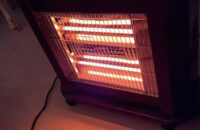The Basics of Space Heaters – How to Avoid Fire Damage
 Space heaters are a very efficient and relatively convenient way to heat up your home – especially when compared to fireplaces. There are several types of space heaters out there, each with its own pros and cons, but the most important element remains the same; despite their convenience, they are dangerous.
Space heaters are a very efficient and relatively convenient way to heat up your home – especially when compared to fireplaces. There are several types of space heaters out there, each with its own pros and cons, but the most important element remains the same; despite their convenience, they are dangerous.
According to the NFPA, a majority of fire deaths (81%) can be attributed to the improper use or storage of portable or stationary space heaters. That is not to say that space heaters should be abandoned, though. Instead, people need to understand the dangers posed by space heaters and what can be done to avoid them. Furthermore, it is important to understand the fire damage restoration process that follows space heater fires.
This article will go over the dangers posed by space heaters and safety protocols that you should follow to avoid the risk of fire damage.
Understanding The Dangers of Space Heaters
Space heaters may not look like much, but there is an inherent risk of the heater burning anything in its proximity. Furthermore, if the regulators within the heater break (which isn’t such a rare case, unfortunately), the heater can keep on functioning at full capacity and therefore overload.
It is important that you look for labels suggesting that the heater has been tested in a recognized laboratory. When you turn the heater on, especially for the first time, make sure there is nothing in its proximity. Read the instruction manual that came with the heater to know what the proximity barrier is for the heater.
Safely Operating Space Heaters
When operating a space heater
- Keep wooden items, clothing, papers, and other flammable objects away.
- Do not put the heater on or near carpets and curtains.
- Check the cord. The plug may be broken or be loose in the socket. Secure the connection and if you find that the plug is damaged, replace it immediately. Do not use a space heater with a damaged plug.
- Try not to use the space heater on an extension cord. Plug it directly into a socket.
- If there is no one in the room, turn the space heater off. It might be tempting to leave it on as you go out for an errand, but an unattended space heater is practically an invitation for fire damage.
- Do not let children or pets play near the space heater.
- Turn the space heater off when sleeping.
Placement of Space Heaters
The body of a space heater can get very hot very quickly. This is why you should never leave a space heater in a high-traffic area. Not only are they a tripping hazard, but accidentally touching the space heater can also lead to burns.
For optimal safety, we recommend keeping wooden items no less than 3 feet away from the heater. Rugs and curtains should be kept further away. Clothing items, paper, and cardboard can light up fairly easily if a space heater throws direct heat at them, so make sure they are well out of the way.
Buying a Space Heater
The safety of space heaters begins the moment you purchase one, so make sure you go with the safer option. Because of their general nature and the risk of fire and smoke damage posed by space heaters, recent advancements have all been geared towards efficiency and safety.
There are several features to keep in mind when looking for a space heater, such as:
- Tip-over switch
- Overheat sensor
- Touch sensor
- Quick cool
- Automatic shutdown
- Proximity alert, and more.
Furthermore, you should look at the wattage of your heater when purchasing as well. Just like you look at the tonnage of air conditioners, for space heaters, you need to consider electric space heaters’ wattage. Usually, electric space heaters range from 400 to 1,500 watts.
Higher wattage means that the heater will run hotter and will heat the room quicker. A 10×12 room (with 10-foot ceilings) will need a space heater with a 1500-watt capacity. There are large,r, industrial-scale heaters as well, but they may not be suitable for homes. A furnace would fare much better for you if you have a larger room.
Note: Space heaters are supposed to provide supplemental heat only. It isn’t suitable for warming fabric, cooking food, or drying clothing. People often try to dry out socks with their heaters, which is a sure-fire way to start a fire.
Maintenance
And finally, one of the most important aspects of avoiding fire damage from space heaters; you must keep your space heater well maintained at all times. Use the space heaters in addition to your current means of heating, be it a fireplace or an existing HVAC system, to reduce the impact on its performance.
Check the space heater’s cord regularly for damage or fraying. If you find that the outer layer is cracked, discolored, or otherwise deformed, get it replaced immediately.
If you are confused about anything pertaining to your space heater, you can contact the provider or even call 911 Restoration of Tampa. We’d love to help you use it properly and avoid the risk of fire. If you need help after an incident, our fire damage restoration crews can come over right away. We have a 45-minute response time and 24/7 availability, 365 days a year!



